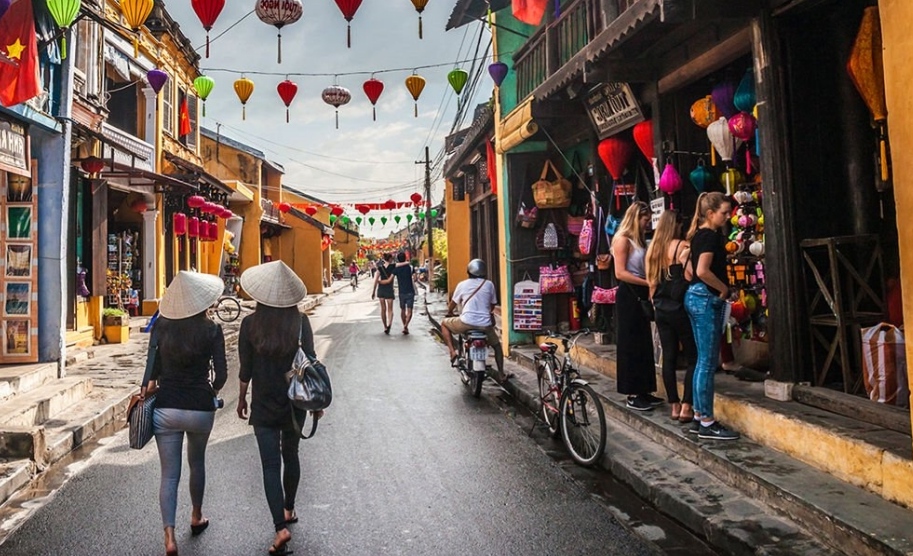Planning A Tour Of Vietnam

“ Thailand is often nicknamed the ‘land of a thousand 7-elevens’, with a convenience store on just about every corner, there are very few of these in Vietnam, for now.”
With the Thai Baht on a high at the moment, along with stricter enforcement of visa rules, some expats say they’ve had enough and are heading to Vietnam, or some other south east Asian country, where they might improve their personal situation.
For example, an expat pensioner, on a fixed income, from a country where the Thai baht has risen against your currency, Thailand has become a more expensive option – perhaps impossible to make ends meet anymore with your old pension.
The British pound, as just one currency, has gone from around 55 baht to the pound four years ago, to now around 39 baht, a big loss in value. Meanwhile the cost of living in Thailand has risen over the last decade.
But Vietnam has its own challenges and, whilst being an amazing place to explore as a tourist, may not be to everyone’s taste as a place to retire or enjoy your extended stay. If you think it’s ‘better’ than Thailand to live as an expat you’re in for a few rude shocks. We love Vietnam but estimate it has another decade or so until its ready to cater for longer-term expats, unless you work there of course.
The people
Both Thais and Vietnamese are proud cultures – Thailand ‘because we’ve never been colonised’ (which you’ll hear ad nauseam any time the topic comes up), and Vietnam because they’ve fended off the Chinese and French, and beaten the Americans in the Vietnam War.
Both are very elegant cultures, rich and exotic and rooted in similar cultural festivals and Buddhist traditions.
But, whereas the Thais have weaponised their trademark ‘smile’ into a cultural tourist attraction, the Vietnamese remain a bit more, well, unsmiling. This is not because they’re rude or not embracing of westerners and western tourism, it’s just they are a bit more reserved in expressing an outward smile, unless it’s deserved. On the other hand, the Thai smile can mean 20 different things, not always in your favour.
Whilst many westerners fall ‘in love’ with Thailand, it’s difficult to see that same sort of ‘love’ being associated with Vietnam. Whatever magic spell Thailand seems to weave on western tourists doesn’t seem to happen as much in Vietnam. That’s not to say you won’t have wonderful and astonishing experiences in Vietnam, but it’s palpably ‘different’.
Costs
For a tourist the costs can vary a lot in both countries between the out-of-town locations and the tourist magnets. For tourists, you’re just going to pay more in both countries, compared to the locals. Hotels and transport will cost you much the same in both countries for things like hotels and bike rentals.
Whilst many westerners fall ‘in love’ with Thailand, it’s difficult to see that same sort of ‘love’ being associated with Vietnam. Whatever magic spell Thailand seems to weave on western tourists doesn’t seem to happen as much in Vietnam. That’s not to say you won’t have wonderful and astonishing experiences in Vietnam, but it’s palpably ‘different’.
For a long-stay expat finding long-term accommodation in Thailand is easy – there’s an oversupply of condos, villas and old houses. In Vietnam it’s a lot more complex to find something and probably more expensive, like-for-like. That’s mainly to the immaturity of the property market which, again, is catching up fast.
Finding a cheap beer will be easier these days in Vietnam but the culture of bars and nightlife is completely different in Vietnam, when compared to the infamous bar culture in Thailand.
The bar girls serve you drinks and wash dishes in Vietnam whilst we know the bar girls in Thailand often provide additional services. If you’re heading to Vietnam for a vibrant and crazy nightlife you’re going to be a bit disappointed.
Food, once you get out of the tourist hubs and cities in Vietnam, is very cheap and delicious but you’ll never have the same choice or range of flavours you enjoy with Thai food.
Language
English is much more commonly used in Thailand, especially in any of the popular tourist spots, and is a compulsory subject in Thai schools. But out of the tourist zones any English spoken is ‘basic’ at best.
Outside the two cities or tourist spots in Vietnam, you’ll be battling with English or any other foreign language. English is not a part of the Vietnamese school curriculum.
Driving
The Vietnamese drive on the opposite side of the road, the right side, compared to Thailand. This may not be a huge issue but is certainly something you’ll need to adapt to quickly to avoid potential disasters on the roads.
Speaking of the roads…
Roads
Vietnam is catching up to Thailand fast in the way of infrastructure but, beyond the major cities, you’ll find Vietnam’s roads a lot less drivable than roads in Thailand. As a rough guess, Vietnam’s road network is 30 years or so behind Thailand for now, but catching up quickly.
Beyond the physical roads, the behaviour of Vietnamese drivers is entirely different from Thailand, and the west. The key word here would be ‘merge’. Just go with the herd and don’t drive defensively. When you come to an intersection the ability for Vietnamese drivers to weave through the traffic is one of the great wonders of the modern world. The busier the intersection, the more amazing it is to watch.
Whilst appearing completely chaotic to an outsider the ‘system’ all works very well.
The actual road toll in Vietnam isn’t much better than Thailand, which is pretty bad! The annual road toll in Vietnam, per capita, is around 25% less than Thailand.
And then there’s the tooting of horns. Whilst tooting someone in Thailand with your car or motorcycle horn will get some serious looks (and sometimes the cause of serious road rage), in Vietnam it’s common.
Actually, more than common, just part of the soundtrack of Vietnam’s roads. Usually just a mere courtesy to traffic you’re passing, Vietnamese drivers will routinely toot a motorbike or car as they’re about to pass them. So get ready for a whole new realm of noise pollution.
Influences
Both countries have long and rich traditions, Thailand’s recent history a lot more stable than Vietnam which became a colonial punching bag in the middle of the last century, in the form of the Indo-Chinese War with the French then the Americans.
In the case of the latter, a drawn-out 20 year invasion by the US left Vietnam a crushed and divided country and caused the collapse of governments in neighbouring Cambodia and Laos. For Cambodia the consequences were disastrous. Both countries now are ruled by ‘communist’ governments.
Thailand is a constitutional monarchy and the former king, King Bhumibol, was greatly loved and respected. His son, King Maha Vachiralongkorn, now maintains the customs and traditions of the Thai monarchy. His coronation was an elaborate ceremony in May 2019 celebrated by all Thais.
The main religion in Thailand is Theravada Buddhism. Monks retain high status and are a big part of daily life, from festivals to daily blessings. Young Thai men become novice monks for a period – usually 1-3 weeks – to earn “merit” for their families.
Thailand is a hodge podge of old culture and traditions fused with modern western influences – often at the same time. Thais celebrate everything and are reasonably tolerant to all cultures. Thai people always try and make their work and daily life ‘fun’ (or sanook) and have a huge passion for food. Thais never eat alone.
On the other hand Vietnam has a more defined cultural contrast than Thailand and can be a bit more opaque to western travellers. Unlike Thailand that has not had any major colonial influences, Vietnam has been hammered with three key impacts to its recent history – China, France and the US.
Centuries of Chinese occupation has had a profound historical legacy on Vietnamese thinking and customs. This heavily influences their customs, traditions and beliefs. The legacy of French colonialism, which lasted six decades from the 1880s, has mostly influenced distinctive French architecture and food.
To that end, Vietnam has maintained a more authentic local culture whilst Thai culture has been more flexible to accommodate the large influx of tourists and investment. Vietnam will certainly have more cultural surprises which many travellers will find more interesting. But that also makes travelling, and living in Vietnam, more challenging.
Transportation
Thailand wins hands down with convenience, options and comfort. Travelling around Vietnam, although progressing quickly, is still more of an adventure.
In Vietnam, air transport is excellent and opening up fast, but the country’s road and rail transport infrastructure is still a ‘challenge’. If you’re travelling to Vietnam you may find it more convenient to take organised tours at this stage as the FITs (free and independent travellers) will certainly need more patience than they would in Thailand.
Thailand is already highly developed in tourism with airlines serving both international and domestic routes. You are spoiled by choice. There’s plenty of local transportation, not necessarily cheap anymore, with options in the cities from tuk tuks, taxis and motorcycles.
Bangkok has a modern mass transport system that now links most of the city’s main locations. There’s also thousands of tour companies and options for just about any sort of holiday. It’s one of the world’s most popular tourist destinations for good reason.
In comparison, there are not that many international flights from western countries to Vietnam, but the situation is changing fairly quickly.
Thailand is served by far more airlines, from all over the world. Thailand also has much better domestic travel facilities and services than Vietnam.
Domestic flights in Vietnam are very convenient, and there are many flights between the main cities. But domestic buses and trains are ‘basic’ in Vietnam, compared to Thailand which has more comfortable options.
Visas
You can’t just land in Vietnam and get a visa on arrival. It doesn’t exist except for ASEAN countries (for less than 30 days), and a handful of other countries for 15 days only (the situation changes often so ask Mr Google before you book your flight).
There are three ways of obtaining a visa for Vietnam – via a Vietnamese Embassy or Consulate, an E-Visa, or a Visa on Arrival (which requires a sponsor letter and pre-approval). The E-visa is a pilot electronic visa system launched in 2017 – visitors can apply for a 1 month single-entry visa by paying US$25 via the official immigration platform.
Business visas are a little trickier. Applicants need to get an official entry clearance from their sponsor, usually their employer. This visa allows for multiple entries and lasts for up to one year. If you plan to apply for a business visa, you have to obtain approval from the Vietnamese Immigration Department through your sponsor.
If you do not have a business partner, employer, or other sponsor who can provide you with an entry clearance, you can also apply for a business visa for a stay of up to 90 days.
Diplomatic and official visas can be applied for without having to pay any visa fee.
For long-termers you better consult your local embassy because the situation changes fairly often. Suffice to say, you can’t just come and stay in Vietnam without a lot of paperwork and occasional frustration.
There is a Permanent Resident Card but its qualifications are fairly odious and would require the assistance of a proper immigration lawyer or agent.
Only in Phu Quoc, the southern ‘tropical-island-Phuket-wannabe’, off the coast of Cambodia, can you arrive without a visa. You can get stamped in for free for up to 30 days, but you’ll then need a visa if you want to take the ferry or fly to Ho Chi Minh City, for example.
Thailand is much more convenient with respect to visas. Passport holders from 57 countries, including the citizens of most European countries, Australia and the US, can enter Thailand for up to 30 days without having to apply for a visa beforehand.
For long-termers there are a number of categories, including business visas, ‘retirement’ visas, smart visas and a few other categories. All require application and plenty of paperwork.
Recently the Thai government has cracked down on the enforcement of qualification for many visas which is causing problems for some long-termers that have ‘fallen through the cracks’ in the past but are now finding visa extensions a bit more difficult.
In both cases, you’ll need to provide some proof of assets to stay long-term. Vietnam is starting to become much more stringent as it starts to become more popular and, like Thailand, you can find a lot of variation in ‘application’ of the immigration laws, depending on where you are.
Food
Thai cuisine is better known than Vietnamese cuisine. Anywhere in the world you’re going to find more Thai restaurants and the flavours and dishes of Thailand are easier to define and describe that their Vietnamese counterparts.
But Vietnamese cuisine has its own features and is becoming more popular. It can also be spicy and pungent, with plenty of fresh herbs, although generally less spicy than Thai food. But you’ll be able to dine cheaper in Vietnam than in Thailand, whether in the capitals or on the streets in the countryside.
Vietnamese food also has a French influence with a developed coffee culture and excellent bakeries.
And whilst Thailand is often nicknamed the “land of a thousand 7-elevens”, with a convenience store on just about every corner, there are none of these in Vietnam, yet.
Currency
In Vietnam you can use Dong or the USD. It’s always best to carry some Dong for local purchases. Local shop owners or taxi drivers will probably accept your USD but will have their own ‘commission’ added to the exchange. Currency exchange is easy in most parts of Vietnam, certainly in the cities.
In Thailand it’s the ‘baht’ or nothing. Your USD will be of no use on the streets and you’ll need to get it changed into the local currency.
There are exchange booths everywhere in tourist hot spots and ATMs will dispense you local baht but be careful of the exchange rates and fees when doing international currency exchanges via an ATM.
Medical care
Thailand has a much better developed medical and health care system than Vietnam at this stage. Relative to western countries, the standards of the hospitals are very high and the medical costs still reasonable although private hospitals have become noticeably more expensive over the last decade.
Vietnam is still decades behind Thailand in this respect although catching up fast. Make sure you have comprehensive health insurance when travelling or living in either country.
Seasons
Thailand generally has a hot season, which usually lasts from March/April to June/July. That turns into the hot and wet season that continues until November as the southwest monsoon swings into action sweeping in moist air from the Indian Ocean. The ‘cool season’ running from December to March, is drier and more comfortable – in the north getting quite cold on some days, in the south drier but never dropping below 20 degrees.
Vietnam has a more diverse climate. The south is divided between wet and dry seasons, which is similar to Thailand. Da Lat and the Central Highlands have their dry season from December to March until the southwest monsoon season. The central lowlands, such as Nha Trang, are protected by the mountains and enjoy a long dry season from January to October.
North Vietnam has a distinct winter and summer, completely different to much of Southeast Asia. The winter, from November to March, is wet and cool. The summer, from May to October, is hot with the occasional typhoon swimming in from the South China Sea.
Scams and annoyances
Both have their fair share.
Vietnam Visa scams – Certain websites offer online visas in exchange for a fee. Vietnamese embassies have issued a message to warn travellers that those websites are not official, and that they often fail to issue visas.
Also, certain travellers thought they were covered by these websites, but once at the airport in Vietnam, the authorities refused them the entry, and they had to go back to their country of origin.
Cheating in the shops can be one of the most annoying problems for travellers to Vietnam. Shops may attract customers by advertising lower prices, but the price may increase at any time and you may end up pulling out more money than what was originally asked for. Continue to read Vietnam Tourist Traps and Scams.
In addition, cheating may even happen as you change money. Since the denominations of dong are very large, sometimes travellers may be confused by the trail of 00000s.
Cheating and scams also happen in Thailand, especially tourist locations. Some restaurants have two menus, one for locals and the other with higher prices for foreigners.
The same applies at some tourist attractions although the two-tier pricing in this case is bracingly rubbed in your face. Beware of taxi and tuk tuk drivers that offer to take you to a ‘cheap’ gem shop, a massage shop or a tailor, or know a ‘friend’ with a cheap hotel. It will end up an expensive ride.
The prices in those shops will certainly shock you, for they will be two or three times higher than the normal prices.
The bar scene in Thailand’s tourist hot spots with its ‘girlie bars’ will delight you with pumping music and tight hot-pants but, as the song ‘One Night in Bangkok’ says “The bars are temples but the pearls ain’t free”. The sex scene in Thailand is, at the same time, strictly illegal, and also in-your-face. The drinks are expensive and the after-drink entertainment might cost a lot, lot more.




